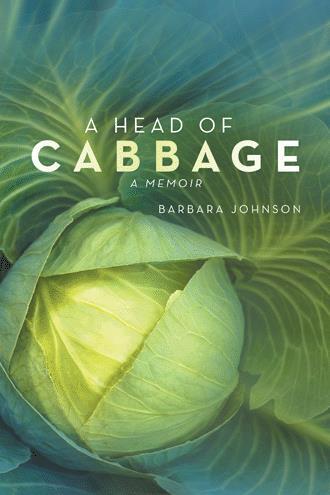A Head of Cabbage: A Poignant Memoir and A Mini-Interview

In an effort to organize my writing space, I’ve resolved to post reviews on books that I read months ago but have put off reviewing. That’s often because it’s difficult to write a review that’s worthy of the book.
From the PublisherBarbara Abbott was eighteen when her father threatened to kill her if she went to school against his will. A sharecropper since he lost his farm in 1956, he needed her on the farm to help plant their annual tobacco crop. Barbara would often sneak away to school, but her mother would retrieve her before her second class started and return her to the fields. Then, after the workday was over, she studied unassigned chapters hoping that she would not get behind in her class assignments due to absences from school. Her father believed living off the land was the best option for southern black people. He never encouraged his children to seek an education; he saw how education had not helped many black people financially and had an extreme distrust of white people and the government. Eventually, Barbara got accepted into Bennett College, a predominately black all-girls school, though she left college after her junior year to marry her high school sweetheart. Then, while pregnant, she discovered that her husband was gay and had a lover living next door. Spanning many decades, this personal narrative shares an account of the everyday life struggles of a black woman and shows her determination to live a life different from those of her ancestors.
ReviewBarbara Johnson’s memoir is a raw and often disturbing look at what this brave woman experienced growing up in poverty in an abusive family. This book is not for the faint of heart; Barbara doesn’t hold back on relaying the full extent of the emotional and physical abuse she suffered. But it is a story that is also infused with hope, love, forgiveness, and wisdom.
It is about a Black woman who overcame obstacles in receiving an education, discrimination in the workplace in the 60s, 70s, and 80s, and economic adversity as a single parent. The book’s title comes from a memory of only having enough money to feed her family with a head of cabbage.
The story opens with Barbara seeking therapy because of her intense anger towards her husband and ends with forgiveness. That’s a lot of territory to cover in 360 pages. In between, readers will find the stark memories of being molested, starting when she was six, continuing into adolescence. Although she’s unsure of why her psychiatrist wants her to talk about these early memories, through therapy, she confronts their destructive hold on her.
Her father constantly tried to keep her from attending school. Here is an excerpt of when she refused to drop out:
Daddy became furious and took a step closer to me. “Gal, you ain’t gonna tell me what you gonna do. I said that you ain’t going to that school house today. That means yo’ ass ain’t going. If you try to get on that shit-ass school bus, I’ll take my shotgun and blow yo’ head off.”…He took a step closer to me and asked, “Do you have a clue as to who you is talking to? I’m yo’ daddy, and I’ll tell you what you can and can’t do.” He turned around and looked at the shotgun hanging on the doorpost several inches above my head.
Barbara describes the intense moments that followed as she walked in fear to the waiting bus. Later in the day, she breaks down and tells her teachers what is going on at home. She confides, “I would rather die than not finish high school.”
Her father’s threats were empty, but it took Barbara years to realize that. With a determination to be the one child in the family to graduate, she faced her father’s bullying and graduated without one family member applauding her achievement. “After that, I told myself not to expect things from my parents that they couldn’t give.”
Barbara includes important conversations that she had with her children. In 1989, they were talking about racism, and Barbara said, “If you don’t recognize something, you can’t acknowledge it, and if you don’t acknowledge it, you can’t change it. That is why every descendant of slaves, every black person in America, needs a psychiatrist- to help us stop hurting and hating.”
Although the context of that conversation was racism, I think it’s a fitting summary of what Barbara learned about herself. I applaud Barbara’s ability to write about her experiences; it is almost unbelievable to consider what she overcame.
InterviewCAROL: What was the hardest part about writing A Head of Cabbage?
BARBARA: Having to relive all the trauma I experienced.
CAROL: How did your family react?
BARBARA: My family was not fond of my memoir because they didn’t appreciate me disclosing the level of poverty we endured and how mean spirited our father was.
CAROL: What have been the responses you received?
BARBARA: Quite a few women have given praise for A Head of Cabbage because many of them could relate to the abuse that I suffered. Many others have told me that reading my memoir helped them to have a better understanding of racism. In all, I have gotten mostly praise.
RecommendationI recommend this book for adults or mature young adults. Barbara’s experiences are often tough to read. Yet, it is a remarkable first-person account of a remarkable woman.
 Barbara Johnson giving a recent writing workshop.
Barbara Johnson giving a recent writing workshop. The post A Head of Cabbage: A Poignant Memoir and A Mini-Interview first appeared on Carol Baldwin - Author, Writing Teacher, Speaker.



